Has someone been telling you that you really should get some psychotherapy or counselling?
And is your response, ‘Damn it, I don’t need therapy!’
‘I don’t want therapy. I don’t need therapy!’
Then you may be relieved to hear that perhaps you shouldn’t go. Why? Because therapy can only work if you are up for it. If you’re saying ‘I don’t need therapy’ then maybe now really isn’t the time.
And if you’re only going to therapy because you feel someone is making you go, then the chances are that the therapy will not be very effective.
Reasons NOT to start therapy or counselling.... Share on XHere are some other reasons for a person not to go for therapy.
If any of them apply to you, it doesn’t mean therapy will never work. It just means you need to think carefully before diving in.
1. It is logistically difficult to get to the therapist’s office.
(This is a journey that you will need to repeat once a week for quite a while. Make sure it is doable).
2. You don’t want to think about your mind, your life, your problems, and your relationships…
…And you definitely, definitely don’t want to discuss that stuff with anyone, even in private.
(Probably best to steer clear of therapy then, and try some distraction techniques instead!)
3. You misuse substances or alcohol, and you don’t have a strong desire to change.
(It’s important that you have a strong wish to get clean, otherwise you won’t progress.)
4. The therapist is your friend or family member’s therapist.
(No matter how wonderful their therapist is, it’s important that you see someone different, someone just for you.)
5. You just want to be told what to do.
(Sorry to disappoint you, but that’s not how therapy works!)
6. You get a bad feeling about this therapist, and your intuition tells you they aren’t a good fit for you.
(Try a couple more therapists, and see if you can find one you click with.)
7. You think all your difficulties are someone else’s fault.
(Therapy definitely won’t help you if you persist in believing that someone else has to change and you don’t.)
8. You see a pattern of the same sort of difficulties repeating over and over in your life, and you think it’s simply ‘bad luck’ and not something that you could ever influence in any way.
(Lots of people experience awful things happening which are not their fault. But if there’s a repeating pattern going on, it’s wise to be open to considering that something about your behaviors or attitude might be contributing to what happens.)
What other reasons can you think of for not going to therapy? Let me know in the comments below! (I might even draw a little cartoon of it to add to this post!)
(…And if you do decide to give therapy or counselling a try, here are some tips for helping your first session go well.)
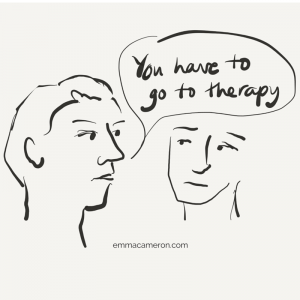
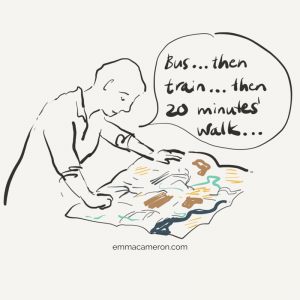
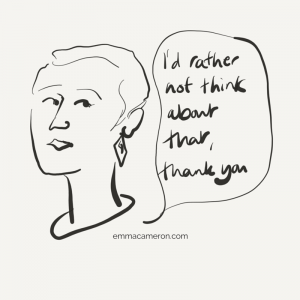
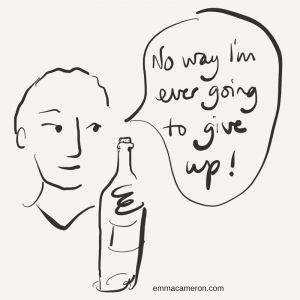

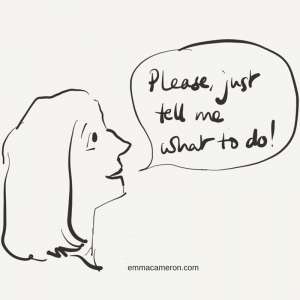



I had to smile at this blog; it drew me right in….how often I have heard similar excuses when people want to learn mindful meditation – want quick fixes and for everyone else to do the work for them….love the upfront dialogue clear and no ambiguity…say it how it is Thanks. Dx
You’ve covered quite a lot of things above – number 4 I think is a great reason not to go 🙂
I didn’t quite understand this one:
“You just want to be told what to do
(Sorry to disappoint you, but that’s not how therapy works!)”
Is that about taking personal responsibility and not relying on someone else to direct you?
Hi Allan, yes, with most types of therapy/ counselling, the work is a collaboration between therapist and client, with both taking responsibility for the work, in different ways. The therapist generally won’t give directions, because it just doesn’t work (they may offer suggestions and recommendations though, depending on what type of therapy they practice).
I seen a counselor 3 times already. In the last couple of weeks, I’ve motivated myself, and seen friends that I haven’t seen in ages.
Does this mean that I should continue to see her. I care for my own life, and maybe I feel down and depress sometimes, but I am taking the initiative to make a change. I have bad sleeping habits, but these are things that no one can help me with, and maybe I can take care of this myself without help.
Maybe if I stop seeing a counselor, then I’ll eventually full back into not caring, and I’ll isolate myself.
Maybe I’m doing alright, but I’ll just keep on going for now, because maybe I ain’t out of the woods yet.
Sounds like seeing your counsellor has helped spark you into some helpful self-care. I think you’re probably right: keeping going with your sessions sounds like a good idea.
re item 4. When I was a nun we had a psychotherapist who came to the community for monthly group sessions. You could choose whether to have a private session afterwards. I always did because I was up for it and the therapist was the only person I could really express myself to. I never knew whether what I said was shared (I like to think not). This was the only therapist I have had value from and I have tried several others since leaving the community. Perhaps the purpose of this community therapy was group based.
How interesting, Vivien. I didn’t know that therapy (group or individual) was available in religious communities. Thanks for sharing your experience.
Family members keep trying to force me to go to counselling. I’m just really not interested. I’ve planned now to just pretend I’m going, to get them off my case. I’m very self content, and I think I would just spend the time talking about what is on my mind, like budgeting, something that annoyed me at work, or what color to paint my cupboards. I just don’t see what’s the point of going to satisfy someone else’s agenda.
Thanks for leaving a comment, Ray. As you suggest, nobody gets much out of therapy if they feel forced to go.
I don’t think pretending to go would help you either, though. The trouble is that pretending just makes us feel inauthentic, which is a horrible feeling.
I guess the main thing is just getting clear about your priorities. And then if you decide that your priority is to build better and more genuine relationships with your family members, then it would be worth trying (an open mind and heart) to find out what it is that’s making them think counselling would help you.
Maybe family therapy would be a way forward – because it’s not about one person being ‘the problem’, it’s more about helping everyone understand where everyone else is coming from, and find new solutions and ways through.
One that I’m guilty of: *you may not fully understand how it works.* I fell into a very common trap, thinking that going to therapy meant I could vent to somebody. While it’s not always a bad thing, it was the therapist who asked me a simple question that made me realize why it didn’t work for me. He asked, “So, now what?” That’s when I realized I didn’t feel ready, because I either don’t want to or may not be able to change anything.
That’s interesting, E.P. Thanks for sharing your experience!